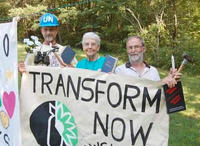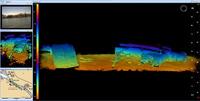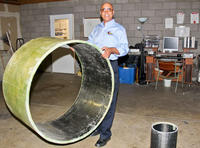-
U.S. risks losing out to Asia in medical research
Medical research saves lives, suffering, and dollars — while also creating jobs and economic activity; the United States has long led the world, with hundreds of thousands of jobs and marketable discoveries generated by government research funding every year; this is now changing: strong, sustained growth in research spending in Asian nations contrasts with U.S. cuts and short-term approach, and a brain drain could result
-
-
Electric plants challenged by high temperatures, drought
The hottest July on record since 1895, along with the most wide-spread drought in the country since 1956, have nuclear plants struggling with finding enough water — cool water — to keep key parts of the plants cool; if the water gets too warm, operators have to dial back production — for reactor safety, and also to regulate the temperature of discharge water, which affects aquatic life
-
-
No-till could help stabilize crop yields despite climate change
Reducing tillage for some Central Great Plains crops could help conserve water and reduce losses caused by climate change, according to studies at the U.S. Department of Agriculture
-
-
Napa Valley hospital employees fearful of new, wearable security system
Employees at a Napa Valley, California hospital are required to carry an alarm device on a lanyard around their necks; the alarm device is about the size of a smart phone and can send and receive signals during an emergency; after incidents in which psychiatric patients tried to choke employees by grabbing and twisting the lanyards, employees want other options for carrying the alarm device
-
-
Electronic nose detects airborne toxins down to the parts per billion level
Research create an electronic nose device with applications in agriculture, industry, homeland security, and the military; the device can detect small quantities of harmful airborne substances
-
-
Invasion at “Fort Knox of Uranium” raises security concerns

The Y-12 National Security Complex in Oak Ridge, Tennessee, is regarded asthe Fort Knox of Uranium, so the fact that three anti-nuclear activists, one of them an 82-year old nun, were able to breach the high-security complex’s protective fences is not reassuring; that they did so using nothing more than bolt cutters, after announcing their arrival from half-a-mile away, and that they could stay, undetected, in a highly secure area on the nuclear complex’s ground for two hours, is even more worrisome
-
-
Y-12 and operator error
Three anti-nuclear activists, led by an 82-year old nun, breached the perimeter security system of the supposedly highly secure Y-2 nuclear facility at Oak Ridge, Tennessee, where nuclear weapons components are manufactured (note that the Oak Ridge National Laboratory [ONRL] is not affiliated with the Y-12 National Security Complex); they then spent several hours in a secure area of the facility, leisurely spray-painting slogans on the facility’s walls – without the facility’s security staff, or the sophisticated $500 million security cameras and sensors, detecting them; to understand what happened at Y-2, we must accept that operator error is an essential problem in national security, and that the problem is pervasive and normal; the only way to deal with the operator error phenomenon is to build redundancies into the system
-
-
China’s food production characterized by corruption, health-threatening practices

A report on Chinese TV showed rotten peaches spiked with sodium metabisulfite to make the fruit look fresh, seasoned in bleaching agents and additives harmful to the human liver and kidneys, and pickled in outdoor pools surrounded by garbage; the peaches are then packed in dirty bags which were previously used to hold animal feed, and shipped off to big brand stores; trouble is, this story is typical of, rather than an exception to, food production practices in China
-
-
Simple new test combats counterfeit drugs in developing countries
The World Health Organization (WHO) estimates that at least 10 percent of the drug supply in developing countries consists of counterfeit medicines, causing thousands of deaths every year; many of the deaths occur among people who unknowingly take counterfeit antibiotics and anti-malaria medicines that do not contain the active ingredient to combat those diseases; in addition to lacking the active ingredient, counterfeit medicines may harm people by containing ingredients that are potentially toxic
-
-
Long Beach Police Department purchases underwater inspection system for port

The Port of Long Beach is the second busiest seaport in the United States and is a major gateway for trade with Asia, handling more than six million containers annually; to enhance port security, the City of Long Beach Police Department has purchased an Underwater Inspection System (UIS) from Cod Octopus
-
-
World could be in for higher food prices
This has been one of the driest summers in American history, but the weather is not only affecting the United States; weak monsoons in India and other weather issues across the globe are affecting crops and could lead to higher food prices in 2013
-
-
Bacteria in tap water traced to the water treatment process
Most of the bacteria that remain in drinking water when it gets to the tap can be traced to filters used in the water treatment process, rather than to the aquifers or rivers where they originated; the findings could open the door to more sustainable water treatment processes that use fewer chemicals and, as a result, produce lower levels of byproducts that may pose health risks; eventually, the work could enable engineers to control the types of microbes in drinking water to improve human health
-
-
New technology combats global pandemic of drug counterfeiting
Drug counterfeiting is so common in some developing countries – in some studies, 50 percent of the drug samples from Southeast Asia have been counterfeit — that patients with serious diseases are at risk of getting a poor-quality drug instead of one with ingredients that really treat their illness
-
-
Remote monitoring market exceeds $29 billion in 2011
A new reports says that the world market for remote monitoring services was worth more than $29 billion in 2011, equivalent to $2.4 billion in recurring monthly revenues (RMR) across the year; the report also estimated that, in the same year, 54 million accounts, or customer locations, were provided with services
-
-
Aerospace materials for on-site building of pipes of infinite length

Concrete and steel pipes are built in short sections to fit on standard 18-wheel trucks; the heavy industrial manufacturing processes, long-distance trucking, and leak-prone joints used in steel and concrete pipe construction exact a heavy toll on the environment, not to mention bottom line; the solution: a new pipe design, consisting of a central layer of lightweight plastic honeycomb, which can be built onsite as a single section of virtually infinite length
-
More headlines
The long view
Factories First: Winning the Drone War Before It Starts
Wars are won by factories before they are won on the battlefield,Martin C. Feldmann writes, noting that the United States lacks the manufacturing depth for the coming drone age. Rectifying this situation “will take far more than procurement tweaks,” Feldmann writes. “It demands a national-level, wartime-scale industrial mobilization.”
Trump Is Fast-Tracking New Coal Mines — Even When They Don’t Make Economic Sense
In Appalachian Tennessee, mines shut down and couldn’t pay their debts. Now a new one is opening under the guise of an “energy emergency.”
Smaller Nuclear Reactors Spark Renewed Interest in a Once-Shunned Energy Source
In the past two years, half the states have taken action to promote nuclear power, from creating nuclear task forces to integrating nuclear into long-term energy plans.
